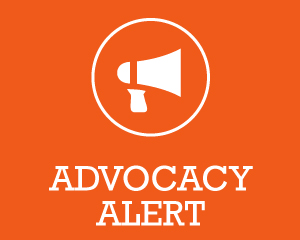Advocacy Alert: Your Action Needed
Tell your Members of Congress to oppose tax reform provisions that harm individuals and families facing rare or chronic medical conditions
Take Action Now
 Congress is currently working on a comprehensive overhaul of the U.S. tax code. The House has already passed a measure and the Senate hopes to consider its proposal early in December. The goal is for both chambers to pass their own bills before going to a conference to negotiate a final proposal. At this time, both the House and Senate tax reform bills include provisions that would harm those affected by rare and/or chronic medical conditions:
Congress is currently working on a comprehensive overhaul of the U.S. tax code. The House has already passed a measure and the Senate hopes to consider its proposal early in December. The goal is for both chambers to pass their own bills before going to a conference to negotiate a final proposal. At this time, both the House and Senate tax reform bills include provisions that would harm those affected by rare and/or chronic medical conditions:
House Bill
- Eliminates the Orphan Drug Tax Credit and provides no new alternative to continue to incentivize and facilitate the development of therapies for rare diseases.
- Eliminates the Deduction for Medical Expenses which many patients and their families claim to help offset the costs of medical care.
Senate Bill
- Eliminates Affordable Care Act’s individual mandate to purchase insurance and the Congressional Budget Office has estimated that this action will result in 13 million Americans losing health coverage.
- With fewer Americans (especially healthy individuals) buying into the insurance market, costs for insurance could drastically increase as the market becomes flooded with individuals that use health insurance frequently
- Drastically restructures the Orphan Drug Tax Credit to make it much less generous and applicable in a way that would drastically reduce rare disease therapy development.
As Congress continues to consider tax reform, and which provisions will be included in any final measures, please contact your Senators and House Representative and ask them to oppose provisions undermining the Orphan Drug Tax Credit, the Medical Expense Deduction, and the individual mandate.
How To Take Action:
- Visit www.senate.gov and identify the contact information for your two Senators by selecting your state.
- Use the contact information for the DC office, which will include a phone number starting with 202
- Visit www.house.gov and identify the contact information for your House Representative by entering your zip code in the upper right corner.
- Call the offices and ask for the Health Legislative Assistant’s voicemail box or e-mail address.
- Use the script below to leave or send a message.
Script for email or phone calls:
Dear _______,
My name is _________ and I am a constituent from [home town]. As the legislative process for tax reform continues to move forward, please oppose any provisions eliminating or diminishing the Orphan Drug Tax Credit, the Medical Expense Deduction, and the individual mandate to purchase insurance. As an advocate for patients and commonsense tax policy, the aforementioned provisions are essential to maintaining medical innovation and promoting comprehensive care.
[Explain a little about your particular situation]
Thank you for time and for your consideration of my request.
Sincerely,
[Name]
[Address]


 The leadership of the House of Representatives is continuing to work with conservative and moderate Republicans in an effort to repeal and replace the Affordable Care Act (ACA). Their proposal, the American Health Care Act (AHCA), was pulled from consideration a few weeks ago when it could not muster the votes to pass. However, House leaders continue to try and find common ground in order to modify the House leadership bill to make it passable.
The leadership of the House of Representatives is continuing to work with conservative and moderate Republicans in an effort to repeal and replace the Affordable Care Act (ACA). Their proposal, the American Health Care Act (AHCA), was pulled from consideration a few weeks ago when it could not muster the votes to pass. However, House leaders continue to try and find common ground in order to modify the House leadership bill to make it passable. Elimination of the federal mandate that insurers offer a minimum level of benefits and allow states the flexibility to decide these benefits would likely mean that many states would have the incentive to not recommend comprehensive benefits to those with pre-existing health conditions. Insurers could also dramatically hike premiums for those with expensive chronic health care needs.
Elimination of the federal mandate that insurers offer a minimum level of benefits and allow states the flexibility to decide these benefits would likely mean that many states would have the incentive to not recommend comprehensive benefits to those with pre-existing health conditions. Insurers could also dramatically hike premiums for those with expensive chronic health care needs.